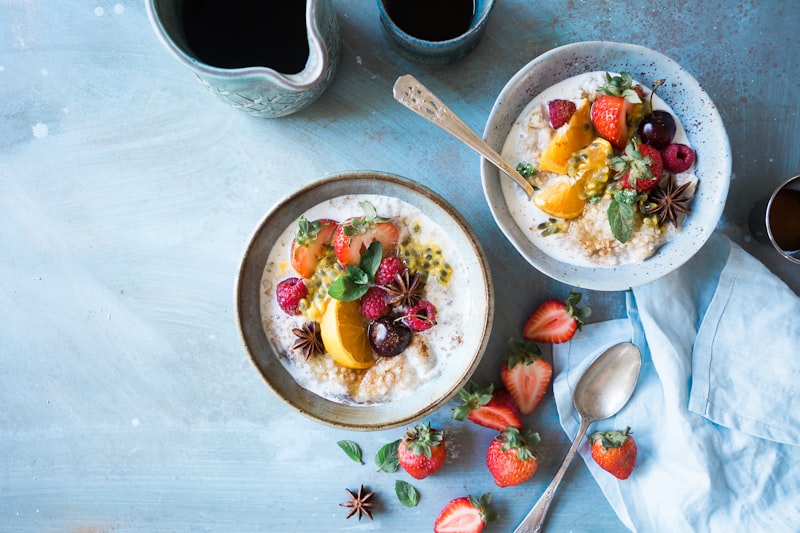How Can You Improve Your Gut Microbiome?
Next up, probiotics are your gut’s best friends. These live bacteria are found in fermented foods like yogurt, kimchi, and sauerkraut. Imagine probiotics as the personal trainers for your gut, helping it stay fit and healthy. They boost the good bacteria and keep the bad ones in check, creating a balanced ecosystem in your digestive tract.
Don’t forget prebiotics, the unsung heroes of gut health. Prebiotics are types of fiber that act as food for the good bacteria. You can find them in foods like bananas, onions, and garlic. Think of prebiotics as the ultimate support crew, ensuring that your beneficial bacteria have all the nourishment they need to thrive.
Variety in your diet is also crucial. Just like you wouldn’t eat the same meal every day, your gut benefits from a diverse range of foods. Each type of food brings different nutrients to the table, supporting a varied microbial population. Aim to include a colorful array of fruits and vegetables in your meals to keep your gut microbiome diverse and happy.
Lastly, reduce stress and get plenty of sleep. Stress can be like a storm cloud over your gut, while good sleep acts as the sunshine. Together, they help maintain a healthy balance of gut bacteria, ensuring your digestive system runs smoothly. By adopting these simple yet effective strategies, you’ll be well on your way to a healthier gut microbiome.
Unlocking the Secrets to a Healthier Gut: Proven Strategies to Improve Your Microbiome
First, let’s talk about diet. Imagine your gut as a garden. Just as plants need the right soil and nutrients, your gut flora thrives on specific foods. Fiber-rich foods, like fruits, vegetables, and whole grains, act as fertilizer for your good bacteria. Probiotics, found in yogurt and fermented foods like kimchi, are like the sunshine and rain your garden needs. They introduce beneficial bacteria that help balance the microbial community.
Next, let’s tackle stress, a sneaky saboteur of gut health. When you’re stressed, your gut can react like a garden hit by a drought—plants wilt, and pests become rampant. Managing stress through mindfulness or exercise can keep your gut’s ecosystem in harmony. It’s all about keeping your internal garden lush and thriving.
And don’t overlook the importance of hydration. Water is like the irrigation system for your gut, ensuring that everything runs smoothly and nutrients are absorbed effectively. Aim for about eight glasses a day to keep things flowing.
Lastly, consider avoiding excessive use of antibiotics. While these medications are lifesavers, they can also disrupt your gut’s balance. Only use them when absolutely necessary and always under a doctor’s guidance.

Revitalize Your Digestive Health: Top Tips for Enhancing Your Gut Microbiome
First off, introducing more fiber into your diet is like giving a feast to your gut bacteria. Think of fiber as the ultimate party food that keeps your microbiome dancing. Foods like fruits, vegetables, and whole grains are rich in fiber and help promote the growth of beneficial bacteria.
Next up, consider adding fermented foods to your menu. These are like the VIP guests at your gut’s party. Yogurt, kimchi, and sauerkraut are packed with probiotics—good bacteria that keep your gut environment balanced. It’s like sending in reinforcements to keep the party lively and healthy.
Prebiotics are another key player. They’re like the backstage crew that supports your gut’s main act. Foods like garlic, onions, and bananas feed the good bacteria, helping them thrive and keep the balance in check.
Hydration also plays a critical role. Think of water as the ultimate cleaner that helps flush out toxins and keeps everything running smoothly. Aim for plenty of water throughout the day to keep your digestive system in top shape.
Lastly, don’t underestimate the power of stress management. Imagine stress as an uninvited guest who disrupts the whole party. Techniques like mindfulness and regular exercise can help keep stress at bay, allowing your gut to function optimally.
So, revitalize your digestive health by feeding your microbiome well, staying hydrated, and managing stress. Your gut will thank you by feeling happier and healthier.
Gut Feeling: How to Transform Your Microbiome for Better Well-being
Think of your microbiome as a bustling city. If everything’s running smoothly, the city thrives. But if the balance tips off—like too much traffic or pollution—the whole system suffers. Similarly, when your microbiome is out of whack, it can lead to issues like digestive discomfort, low energy, or even mood swings. So, how do you turn this microbial metropolis into a well-oiled machine?

But it’s not just about what you eat—how you eat matters too. Eating mindfully, chewing your food thoroughly, and managing stress can all impact your microbiome. Think of stress as a storm cloud hovering over your microbial city, causing chaos and disrupting harmony.
Additionally, cutting back on processed foods and artificial sweeteners can make a big difference. These often disrupt your microbiome’s balance, leaving your gut in disarray.
In essence, transforming your microbiome for better well-being is like tuning up an old engine. With the right fuel and maintenance, it can run smoothly and keep you feeling your best. So, start treating your gut with the care it deserves—it’s more crucial to your overall health than you might think.
Boost Your Gut Health: Essential Steps to Optimize Your Microbiome
First off, let’s talk about diet. Your gut microbiome thrives on fiber, which you can get from fruits, vegetables, and whole grains. Think of fiber as the fuel that keeps your gut city’s engine running smoothly. Foods rich in prebiotics, like garlic, onions, and bananas, act like the city’s maintenance crew, helping beneficial bacteria multiply and thrive. Incorporating fermented foods like yogurt, kimchi, and kombucha is like adding a fresh wave of new residents to your city, each bringing unique benefits.
Hydration also plays a crucial role. Drinking plenty of water helps maintain the balance and function of your gut microbiome. Picture water as the essential services in your city, ensuring everything operates efficiently and preventing any unpleasant surprises.
Reducing stress is another key step. Stress can disrupt your gut city’s harmony, making it harder for beneficial bacteria to do their job. Engaging in relaxation techniques, such as meditation or deep breathing exercises, helps keep your gut environment calm and conducive to health.
Lastly, don’t forget the importance of regular physical activity. Exercise stimulates the growth of beneficial gut bacteria, much like how new infrastructure projects boost a city’s development. Aim for at least 30 minutes of moderate exercise most days of the week to keep your gut metropolis in top shape.
By focusing on these essential steps, you can create a thriving, balanced microbiome that supports your overall health and well-being.
From Bloated to Balanced: Effective Ways to Improve Your Gut Microbiome
Start by inviting more beneficial bacteria to the party. Prebiotics, found in foods like bananas, onions, and garlic, act like a VIP pass for the good bacteria. They feed and nourish these helpful microbes, helping them flourish. Additionally, incorporating probiotics into your diet, such as yogurt or fermented foods like kimchi and sauerkraut, can introduce fresh, friendly bacteria into your gut. Think of it like adding new, enthusiastic residents to your city.
But that’s not all. Reducing your intake of processed foods and sugars is crucial. Imagine these as the troublemakers that throw the city into chaos. They can encourage the growth of less friendly bacteria, exacerbating bloating and other digestive issues. Instead, focus on whole foods like vegetables, fruits, and lean proteins. They help create a healthier environment for your gut microbiome to thrive.
Hydration is another key player. Water isn’t just a drink; it’s the lifeline for your digestive system. It helps in the smooth movement of food through your gut and supports the overall balance of bacteria.
Lastly, don’t forget the power of stress management. Stress can disrupt your gut microbiome, much like a riot can disrupt a city’s peace. Incorporate stress-reducing practices like mindfulness or gentle exercise into your routine to keep your gut—and your entire system—happier.
The Ultimate Guide to Nurturing Your Gut Microbiome: What You Need to Know
So, what’s the secret to a healthy gut microbiome? It starts with the food you eat. Think of your diet as the fuel for this busy city. High-fiber foods, like fruits, vegetables, and whole grains, act as a feast for your gut bacteria. They thrive on fiber, converting it into beneficial compounds that keep the city running smoothly. Probiotics are like the new residents who bring fresh ideas and energy—yogurt, kefir, and fermented foods are excellent sources. They introduce good bacteria to your gut, enhancing its diversity and function.
But it’s not just about what you eat; it’s also about what you avoid. Excessive sugar and processed foods can throw your gut microbiome off balance, like throwing a wrench into the gears of a well-oiled machine. Instead, focus on reducing these culprits to maintain harmony within your gut city.
Don’t overlook the power of hydration. Drinking plenty of water helps your gut stay in balance, ensuring that everything flows smoothly. Think of it as the traffic system keeping everything moving without a hitch.
Stress can also disrupt your gut’s harmony. Imagine your gut city under a constant state of chaos—stress can create that kind of turmoil. Incorporating relaxation techniques like meditation and exercise can help maintain peace and order.
By fueling your gut with the right foods, staying hydrated, and managing stress, you’re ensuring that your gut microbiome remains a thriving, healthy metropolis.
Microbiome Makeover: How to Achieve a Thriving Gut with Simple Changes
One of the ultimate game-changers is incorporating more fiber-rich foods into your diet. Fiber acts like a VIP pass for beneficial bacteria, allowing them to flourish while crowding out the less desirable ones. Foods like whole grains, beans, and fruits are like an all-you-can-eat buffet for these gut-friendly bacteria.
Next up, let’s talk probiotics. These live microorganisms are like the city’s new recruits, coming in to boost the existing workforce. Yogurt, kefir, and fermented vegetables are excellent sources. They’re like giving your gut a fresh crew of hardworking citizens ready to support and maintain balance.
But don’t stop there—prebiotics are just as crucial. These are the nutrients that feed your beneficial bacteria, like a special nutrient-rich fuel for your gut’s engines. Bananas, garlic, and onions are fantastic prebiotic sources, ensuring your gut’s residents have everything they need to thrive.
Hydration also plays a key role. Drinking enough water is like ensuring your city’s infrastructure is always in top shape. It helps keep everything moving smoothly and supports the overall function of your digestive system.
